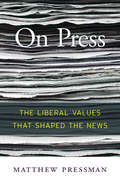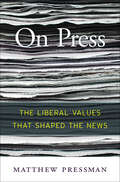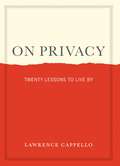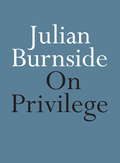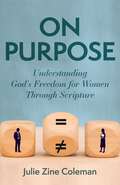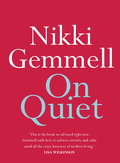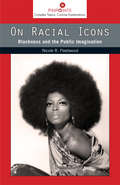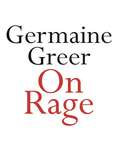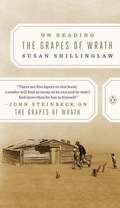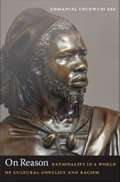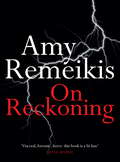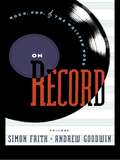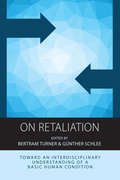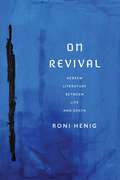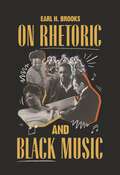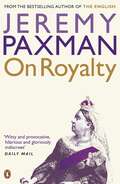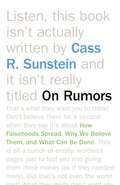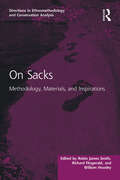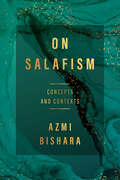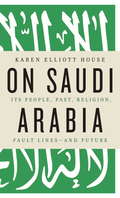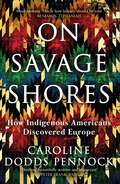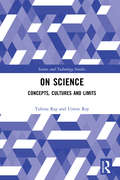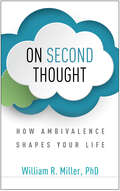- Table View
- List View
On Press: The Liberal Values That Shaped the News
by Matthew PressmanAs Matthew Pressman’s timely history reveals, during the turbulent 1960s and 70s the core values that held the news industry together broke apart and the distinctive characteristics of contemporary American print journalism emerged. Simply reporting the facts was no longer enough as reporters recognized a need to interpret events for their readers.
On Press: The Liberal Values That Shaped the News
by Matthew PressmanA study of how mainstream journalism transformed from 1960 to 1980.In the 1960s and 1970s, the American press embraced a new way of reporting and selling the news. The causes were many: the proliferation of television, pressure to rectify the news media’s dismal treatment of minorities and women, accusations of bias from left and right, and the migration of affluent subscribers to suburbs. As Matthew Pressman’s timely history reveals, during these tumultuous decades the core values that held the profession together broke apart, and the distinctive characteristics of contemporary American journalism emerged.Simply reporting the facts was no longer enough. In a country facing assassinations, a failing war in Vietnam, and presidential impeachment, reporters recognized a pressing need to interpret and analyze events for their readers. Objectivity and impartiality, the cornerstones of journalistic principle, were not jettisoned, but they were reimagined. Journalists’ adoption of an adversarial relationship with government and big business, along with sympathy for the dispossessed, gave their reporting a distinctly liberal drift. Yet at the same time, “soft news”—lifestyle, arts, entertainment—moved to the forefront of editors’ concerns, as profits took precedence over politics.Today, the American press stands once again at a precipice. Accusations of political bias are more rampant than ever, and there are increasing calls from activists, customers, advertisers, and reporters themselves to rethink the values that drive the industry. As On Press suggests, today’s controversies—the latest iteration of debates that began a half-century ago—will likely take the press in unforeseen directions and challenge its survival.Praise for On Press“The ultimate story behind all the stories. In tracing the evolution of news over the past half century, Matthew Pressman has produced an account that’s deeply historical and not a little troubling. In an age when the press is alternately villain or hero, Pressman serves as a kind of medicine man of journalism, telling us how we got from there to here and warning us what must change.” —Graydon Carter, former editor of Vanity Fair“Pressman helps us understand how we came to our current, troubled media moment with his deeply researched, engagingly written history of America’s press in the 1960s and ’70s. This is an important and original contribution—and a needed one.” —Margaret Sullivan, media columnist for the Washington Post
On Privacy: Twenty Lessons to Live By
by Lawrence CappelloA small book with a big message: privacy matters. In an age of constant connectivity, privacy can feel like a relic of the past. "On Privacy" challenges that notion with twenty sharp, practical lessons that show why privacy matters, why it's vital for free societies, and why it's essential for a fulfilling life. Written for those who care about their privacy but aren't about to ditch their devices, this guide cuts through the noise with realistic, actionable steps to safeguard your personal space in the digital age. Short, sensible, and to the point, this book is your roadmap to navigating the complexities of modern privacy in a straightforward, no-nonsense way. On Privacy is small book with a big message about why privacy matters, who profits by invading it, and how best to defend yours in easy, everyday ways.
On Privilege (Little Books On Big Themes Ser.)
by Julian BurnsideRenowned barrister, ethicist and human rights advocate Julian Burnside QC's grandparents lived in a world of handsome cars, elegant tennis parties and coiffed women. As a five-year-old, he saw privilege before he heard the word or learned its meaning. In this powerful broadside that takes in politicians and infamous legal cases, Julian Burnside explores the concept of privilege and the people who have it.
On Purpose: Understanding God's Freedom for Women Through Scripture
by Julie Zine ColemanMany Christian women are torn between how the church has taught traditional gender roles and the liberty they see secular society afford to women. But what if the church's conventional teachings on the place of women aren't really biblical at all?On Purpose is a serious study on the verses in the Bible that have often been interpreted to define the role of women in the church, at home, and in the workplace. Each chapter focuses on a single passage, considering what it meant to the original recipients, understanding each author’s intent, and applying its true meaning in today's cultural setting. With each chapter, Julie Coleman thoroughly reveals how the timeless principles in the Bible actually teach freedom for women. In fact, when rightly understood, these verses are a wake-up call that we are handicapping the church's role on earth by limiting women unnecessarily. Instead, men and women should be working side by side for the advancement of the kingdom of God.Written without anger or judgment, and with no agenda but to delve deep into the Bible, On Purpose is an enlightening study offering a fresh, scriptural perspective. It's time to set women free to answer God's call on their lives--and set the church free to function the way God truly desires.
On Quiet
by Nikki GemmellInternationally bestselling author Nikki Gemmell writes on the power of quiet in today's shouty world. Quiet comes as a shock in these troubled times. Quietism means 'devotional contemplation and abandonment of the will ... a calm acceptance of things as they are'. Gemmell makes the case for why quiet is steadily gaining ground in this noisy age: Why we need it now more than ever. How to glean quiet, hold on to it, and work within it.
On Racial Icons
by Nicole R. FleetwoodWhat meaning does the American public attach to images of key black political, social, and cultural figures? Considering photography's role as a means of documenting historical progress, what is the representational currency of these images? How do racial icons "signify"? Nicole R. Fleetwood's answers to these questions will change the way you think about the next photograph that you see depicting a racial event, black celebrity, or public figure. In On Racial Icons, Fleetwood focuses a sustained look on photography in documenting black public life, exploring the ways in which iconic images function as celebrations of national and racial progress at times or as a gauge of collective racial wounds in moments of crisis. Offering an overview of photography's ability to capture shifting race relations, Fleetwood spotlights in each chapter a different set of iconic images in key sectors of public life. She considers flash points of racialized violence in photographs of Trayvon Martin and Emmett Till; the political, aesthetic, and cultural shifts marked by the rise of pop stars such as Diana Ross; and the power and precarity of such black sports icons as Serena Williams and LeBron James; and she does not miss Barack Obama and his family along the way. On Racial Icons is an eye-opener in every sense of the phrase.
On Racism, Religion And Reconciliation: Contemplation Of Imam W. Deen Mohammed
by Ronald B. ShaheedA brief reflection on the origins of racism and possible solutions.
On Rage
by Germaine GreerON RAGE is Germaine Greer's timeless essay about Aboriginal dispossession. With characteristic acuity and passion, Greer looks to the causes of rage and its consequences in Indigenous Australians.Originally published six months after Prime Minister Kevin Rudd's Apology to the Stolen Generations in 2008, this is an urgent and provocative examination of disempowerment by one of Australia's leading polemicists.
On Reading The Grapes of Wrath
by Susan ShillinglawOne of today's foremost Steinbeck scholars writes an extended meditation on the influence of The Grapes of Wrath, to commemorate the 75th anniversary of its first publication In this compelling biography of a book, Susan Shillinglaw delves into John Steinbeck's classic to explore the cultural, social, political, scientific, and creative impact of The Grapes of Wrath upon first publication, as well as its enduring legacy. First published in April 1939, Steinbeck's National Book Award-winning epic of the Great Depression chronicles the Dust Bowl migration of the 1930s and the story of one Oklahoma farm family, the Joads, driven from their homestead and forced to travel west to the promised land of California. The story of their struggle remains eerily relevant in today's America and stands as a portrait of the conflict between the powerful and the powerless, "in the souls of the people."
On Reason: Rationality in a World of Cultural Conflict and Racism
by Emmanuel Chukwudi EzeGiven that Enlightenment rationality developed in Europe as European nations aggressively claimed other parts of the world for their own enrichment, scholars have made rationality the subject of postcolonial critique, questioning its universality and objectivity. In On Reason, the late philosopher Emmanuel Chukwudi Eze demonstrates that rationality, and by extension philosophy, need not be renounced as manifestations or tools of Western imperialism. Examining reason in connection to the politics of difference--the cluster of issues known variously as cultural diversity, political correctness, the culture wars, and identity politics--Eze expounds a rigorous argument that reason is produced through and because of difference. In so doing, he preserves reason as a human property while at the same time showing that it cannot be thought outside the realities of cultural diversity. Advocating rationality in a multicultural world, he proposes new ways of affirming both identity and difference. Eze draws on an extraordinary command of Western philosophical thought and a deep knowledge of African philosophy and cultural traditions. He explores models of rationality in the thought of philosophers from Aristotle, Ren Descartes, Francis Bacon, and Thomas Hobbes to Noam Chomsky, Richard Rorty, Hilary Putnam, and Jacques Derrida, and he considers portrayals of reason in the work of the African thinkers and novelists Chinua Achebe, Ngugi wa Thiong'o, and Wole Soyinka. Eze reflects on contemporary thought about genetics, race, and postcolonial historiography as well as on the interplay between reason and unreason in the hearings of South Africa's Truth and Reconciliation Commission. He contends that while rationality may have a foundational formality, any understanding of its foundation and form is dynamic, always based in historical and cultural circumstances.
On Reckoning (On Series)
by Amy RemeikisWhat happens when the usual political tactics of deflect and dodge are no longer enough?A reckoning.The Guardian's political reporter Amy Remeikis has spoken before about being a survivor of sexual assault, but Brittany Higgins going public with her story ripped the curtain back not just on political attempts to deal with real-world issues, but also how unsafe women can be, even inside the most protected building in the country. Amy didn't expect to see political leaders fumble the moment so completely. And what followed was people taking back the conversation from the politicians. On Reckoning is a searing account of Amy's personal and professional rage, taking you inside the parliament - and out - during one of the most confronting and uncomfortable conversations in recent memory.
On Record: Rock, Pop and the Written Word
by Simon Frith Andrew GoodwinClassic sociological analyses of 'deviance' and rebellion; studies of technology; subcultural and feminist readings, semiotic and musicological essays and close readings of stars, bands and the fans themselves by Adorno, Barthes and other well-known contributors
On Religious Liberty: Selections from the Works of Roger Williams (The William E. Massey Sr. lectures in the history of American Civilization ; #2008)
by Roger WilliamsBanished from the Massachusetts Bay Colony for his refusal to conform to Puritan religious and social standards, Roger Williams established a haven in Rhode Island for those persecuted in the name of the religious establishment. He conducted a lifelong debate over religious freedom with distinguished figures of the seventeenth century, including Puritan minister John Cotton, Massachusetts governor John Endicott, and the English Parliament. James Calvin Davis gathers together important selections from Williams's public and private writings on religious liberty, illustrating how this renegade Puritan radically reinterpreted Christian moral theology and the events of his day in a powerful argument for freedom of conscience and the separation of church and state. For Williams, the enforcement of religious uniformity violated the basic values of Calvinist Christianity and presumed upon God's authority to speak to the individual conscience. He argued that state coercion was rarely effective, often causing more harm to the church and strife to the social order than did religious pluralism. This is the first collection of Williams's writings in forty years reaching beyond his major work, The Bloody Tenent, to include other selections from his public and private writings. This carefully annotated book introduces Williams to a new generation of readers.
On Retaliation: Towards an Interdisciplinary Understanding of a Basic Human Condition (Integration and Conflict Studies #15)
by Günther Schlee Bertram TurnerRetaliation is associated with all forms of social and political organization, and retaliatory logics inform many different conflict resolution procedures from consensual settlement to compensation to violent escalations. This book derives a concept of retaliation from the overall notion of reciprocity, defining retaliation as the human disposition to strive for a reactive balancing of conflicts and injustices. On Retaliation presents a synthesized approach to both the violence-generating and violence-avoiding potentials of retaliation. Contributors to this volume touch upon the interaction between retaliation and violence, the state's monopoly on legitimate punishment and the factors of socio-political frameworks, religious interpretations and economic processes.
On Revival: Hebrew Literature Between Life and Death (Jewish Culture and Contexts)
by Roni HenigA critique of the discourse of language revival in modern Hebrew literatureOn Revival is a critique of one of the most important tenets of Zionist thinking: “Hebrew revival,” or the idea that Hebrew—a largely unspoken language before the twentieth century—was revitalized as part of a broader national “revival” which ultimately led to the establishment of the Israeli nation-state. This story of language revival has been commemorated in Israeli popular memory and in Jewish historiography as a triumphant transformation narrative that marks the success of the Zionist revolution. But a closer look at the work of early twentieth-century Hebrew writers reveals different sentiments.Roni Henig explores the loaded, figurative discourse of revival in the work of Hebrew authors and thinkers working roughly between 1890 and 1920. For these authors, the language once known as “the holy tongue” became a vernacular in the making. Rather than embracing “revival” as a neutral, descriptive term, Henig takes a critical approach, employing close readings of canonical texts to analyze the primary tropes used to articulate this aesthetic and political project of “reviving” Hebrew. She shows that for many writers, the national mission of language revival was entwined with a sense of mourning and loss. These writers perceived—and simultaneously produced—the language as neither dead nor fully alive. Henig argues that it is this figure of the living-dead that lies at the heart of the revival discourse and which is constitutive of Jewish nationalism.On Revival contributes to current debates in comparative literary studies by addressing the limitations of the national language paradigm and thinking beyond concepts of origin, nativity, and possession in language. Informed by critical literary theory, including feminist and postcolonial critiques, the book challenges Zionism’s monolingual lens and the auto-Orientalism involved in the project of revival, questioning charged ideological concepts such as “native speaker” and “mother tongue.”
On Rhetoric and Black Music (African American Life Series)
by Earl H. BrooksThis groundbreaking analysis examines how Black music functions as rhetoric, considering its subject not merely reflective of but central to African American public discourse. Author, musician, and scholar Earl H. Brooks argues that there would have been no Harlem Renaissance, Civil Rights Movement, or Black Arts Movement as we know these phenomena without Black music. Through rhetorical studies, archival research, and musical analysis, Brooks establishes the "sonic lexicon of Black music," defined by a distinct constellation of sonic and auditory features that bridge cultural, linguistic, and political spheres with music. Genres of Black music such as blues and jazz are discursive fields, where swinging, improvisation, call-and-response, blue notes, and other musical idioms serve as rhetorical tools to articulate the feelings, emotions, and states of mind that have shaped African American cultural and political development. Examining the resounding artistry of iconic musicians such as Scott Joplin, Mary Lou Williams, Duke Ellington, John Coltrane, and Mahalia Jackson, this work offers an alternative register in which these musicians and composers are heard as public intellectuals, consciously invested in crafting rhetorical projects they knew would influence the public sphere.
On Royalty: A Very Polite Inquiry Into Some Strangely Related Families
by Jeremy PaxmanWhat is the point of Kings and Queens? What do they do all day? And what does it mean to be one of them? Jeremy Paxman is used to making politicians explain themselves – but royalty has always been off limits. Until now. In On Royalty he delves deep into the past and takes a long hard look at our present incumbents to find out just what makes them tick. Along the way he discovers some fascinating and little-known details. Such as: • how Albania came to advertise in England for a king• which English queen gave birth in front of 67 people• how easy it is to beat up future kings of England • and how meeting the Queen is a bit scary – whoever you are …No other book will tell you quite as much about our kings, queens, princes and princesses: who they are and what they’re for.
On Rumors: How Falsehoods Spread, Why We Believe Them, and What Can Be Done
by Cass R. SunsteinMany of us are being misled. Claiming to know dark secrets about public officials, hidden causes of the current economic situation, and nefarious plans and plots, those who spread rumors know precisely what they are doing. And in the era of social media and the Internet, they know a lot about how to manipulate the mechanics of false rumors—social cascades, group polarization, and biased assimilation. They also know that the presumed correctives—publishing balanced information, issuing corrections, and trusting the marketplace of ideas—do not always work. All of us are vulnerable.In On Rumors, Cass Sunstein uses examples from the real world and from behavioral studies to explain why certain rumors spread like wildfire, what their consequences are, and what we can do to avoid being misled. In a new afterword, he revisits his arguments in light of his time working in the Obama administration.
On Sacks: Methodology, Materials, and Inspirations (Directions in Ethnomethodology and Conversation Analysis)
by Robin James SmithThis book is devoted to the reintroduction of the remarkable approach to sociological inquiry developed by Harvey Sacks. Sacks’s original analyses – concerned with the lived detail of action and language-in-interaction, discoverable in members’ actual activities – demonstrated a means of doing sociology that had previously seemed impossible. In so doing, Sacks provided for highly technical, detailed, yet stunningly simple solutions to some of the most trenchant troubles for the social sciences relating to language, culture, meaning, knowledge, action, and social organisation. In this original collection, scholars working in a range of different fields, including sociology, human geography, communication and media studies, social psychology, and linguistics, outline the ways in which their work has been inspired, influenced, and shaped by Sacks’s approach, as well as how their current research is taking Sacks’s legacy forward in new directions. As such, the collection is intended to provide both an introduction to, and critical exploration of, the work of Harvey Sacks and its continued relevance for the analysis of contemporary society.
On Salafism: Concepts and Contexts (Stanford Studies in Middle Eastern and Islamic Societies and Cultures)
by Azmi BisharaOn Salafism offers a compelling new understanding of this phenomenon, both its development and contemporary manifestations. Salafism became associated with fundamentalism when the 9/11 Commission used it to explain the terror attacks and has since been connected with the violence of the so-called Islamic State. With this book, Azmi Bishara critically deconstructs claims of continuity between early Islam and modern militancy and makes a counterargument: Salafism is a wholly modern construct informed by specific sociopolitical contexts. Bishara offers a sophisticated account of various movements—such as Wahabbism and Hanbalism—frequently collapsed into simplistic understandings of Salafism. He distinguishes reformist from regressive Salafism, and examines patterns of modernization in the development of contemporary Islamic political movements and associations. In deconstructing the assumptions of linear continuity between traditional and contemporary movements, Bishara details various divergences in both doctrine and context of modern Salafisms, plural. On Salafism is a crucial read for those interested in Islamism, jihadism, and Middle East politics and history.
On Saudi Arabia: Its People, Past, Religion, Fault Lines - and Future
by Karen Elliott HouseFrom the Pulitzer Prize-winning reporter who has spent the last thirty years writing about Saudi Arabia--as diplomatic correspondent, foreign editor, and then publisher of The Wall Street Journal--an important and timely book that explores all facets of life in this shrouded Kingdom: its tribal past, its complicated present, its precarious future. Through observation, anecdote, extensive interviews, and analysis Karen Elliot House navigates the maze in which Saudi citizens find themselves trapped and reveals the mysterious nation that is the world's largest exporter of oil, critical to global stability, and a source of Islamic terrorists. In her probing and sharp-eyed portrait, we see Saudi Arabia, one of the last absolute monarchies in the world, considered to be the final bulwark against revolution in the region, as threatened by multiple fissures and forces, its levers of power controlled by a handful of elderly Al Saud princes with an average age of 77 years and an extended family of some 7,000 princes. Yet at least 60 percent of the increasingly restive population they rule is under the age of 20. The author writes that oil-rich Saudi Arabia has become a rundown welfare state. The public pays no taxes; gets free education and health care; and receives subsidized water, electricity, and energy (a gallon of gasoline is cheaper in the Kingdom than a bottle of water), with its petrodollars buying less and less loyalty. House makes clear that the royal family also uses Islam's requirement of obedience to Allah--and by extension to earthly rulers--to perpetuate Al Saud rule. Behind the Saudi facade of order and obedience, today's Saudi youth, frustrated by social conformity, are reaching out to one another and to a wider world beyond their cloistered country. Some 50 percent of Saudi youth is on the Internet; 5.1 million Saudis are on Facebook. To write this book, the author interviewed most of the key members of the very private royal family. She writes about King Abdullah's modest efforts to relax some of the kingdom's most oppressive social restrictions; women are now allowed to acquire photo ID cards, finally giving them an identity independent from their male guardians, and are newly able to register their own businesses but are still forbidden to drive and are barred from most jobs. With extraordinary access to Saudis--from key religious leaders and dissident imams to women at university and impoverished widows, from government officials and political dissidents to young successful Saudis and those who chose the path of terrorism--House argues that most Saudis do not want democracy but seek change nevertheless; they want a government that provides basic services without subjecting citizens to the indignity of begging princes for handouts; a government less corrupt and more transparent in how it spends hundreds of billions of annual oil revenue; a kingdom ruled by law, not royal whim. In House's assessment of Saudi Arabia's future, she compares the country today to the Soviet Union before Mikhail Gorbachev arrived with reform policies that proved too little too late after decades of stagnation under one aged and infirm Soviet leader after another. She discusses what the next generation of royal princes might bring and the choices the kingdom faces: continued economic and social stultification with growing risk of instability, or an opening of society to individual initiative and enterprise with the risk that this, too, undermines the Al Saud hold on power. A riveting book--informed, authoritative, illuminating--about a country that could well be on the brink, and an in-depth examination of what all this portends for Saudi Arabia's future, and for our own.From the Hardcover edition.
On Savage Shores: How Indigenous Americans Discovered Europe
by Caroline Dodds PennockWe have long been taught to presume that modern global history began when the 'Old World' encountered the 'New', when Christopher Columbus 'discovered' America in 1492. But, as Caroline Dodds Pennock conclusively shows in this groundbreaking book, for tens of thousands of Aztecs, Maya, Totonacs, Inuit and others - enslaved people, diplomats, explorers, servants, traders - the reverse was true: they discovered Europe. For them, Europe comprised savage shores, a land of riches and marvels, yet perplexing for its brutal disparities of wealth and quality of life, and its baffling beliefs. The story of these Indigenous Americans abroad is a story of abduction, loss, cultural appropriation, and, as they saw it, of apocalypse - a story that has largely been absent from our collective imagination of the times. From the Brazilian king who met Henry VIII to the Aztecs who mocked up human sacrifice at the court of Charles V; from the Inuk baby who was put on show in a London pub to the mestizo children of Spaniards who returned 'home' with their fathers; from the Inuit who harpooned ducks on the Avon river to the many servants employed by Europeans of every rank: here are a people who were rendered exotic, demeaned, and marginalised, but whose worldviews and cultures had a profound impact on European civilisation. Drawing on their surviving literature and poetry and subtly layering European eyewitness accounts against the grain, Pennock gives us a sweeping account of the Indigenous American presence in, and impact on, early modern Europe.
On Science: Concepts, Cultures and Limits (Science and Technology Studies)
by Urmie Ray Tuhina RayOn Science: Concepts, Cultures, and Limits explores science and its relationship with religion, philosophy, ethics, mathematics, and with socio-economic changes. The book gives an overview of the metaphysical contexts in which science emerged and the particular forms science has taken in history. It examines the preoccupation of ancient cultures with the validity of interpretations of natural phenomena, the role of the study of materials in the substantiation of the conceptual world, and the establishment of modern science on both experimentation and mathematics. This theoretical discussion is illustrated by a host of examples from physics to the life sciences, which highlight how current concepts developed over the centuries, or even millennia. The volume underscores some of the weaknesses inherent in a scientific approach, and how in the modern context of a wealth-driven technological orientation, these have been conducive to a gradual distortion of science into its exact opposite, a dogmatic faith. It further discusses the nature of scientific education in the world, and how conditions can be created to ensure pioneering creativity and to preserve scientific rigor. The book will be of great interest to scholars, teachers and researchers of science, the metaphysics and philosophy of science, mathematics, science and technology studies, epistemology, ethics, history and sociology. It will also be useful for general readers who are interested in the history of scientific discoveries and ideas as well as in the issues surrounding science today, in particular its relations with many urgent problems.
On Second Thought: How Ambivalence Shapes Your Life
by William R. MillerThe rich inner world of a human being is far more complex than either/or. You can love and hate, want to go and want to stay, feel both joy and sadness. Psychologist William Miller--one of the world's leading experts on the science of change--offers a fresh perspective on ambivalence and its transformative potential in this revealing book. Rather than trying to overcome indecision by force of will, Dr. Miller explores what happens when people allow opposing arguments from their &“inner committee members&” to converse freely with each other. Learning to tolerate and even welcome feelings of ambivalence can help you get unstuck from unwanted habits, clarify your desires and values, explore the pros and cons of tough decisions, and open doorways to change. Vivid examples from everyday life, literature, and history illustrate why we are so often "of two minds," and how to work through it.
